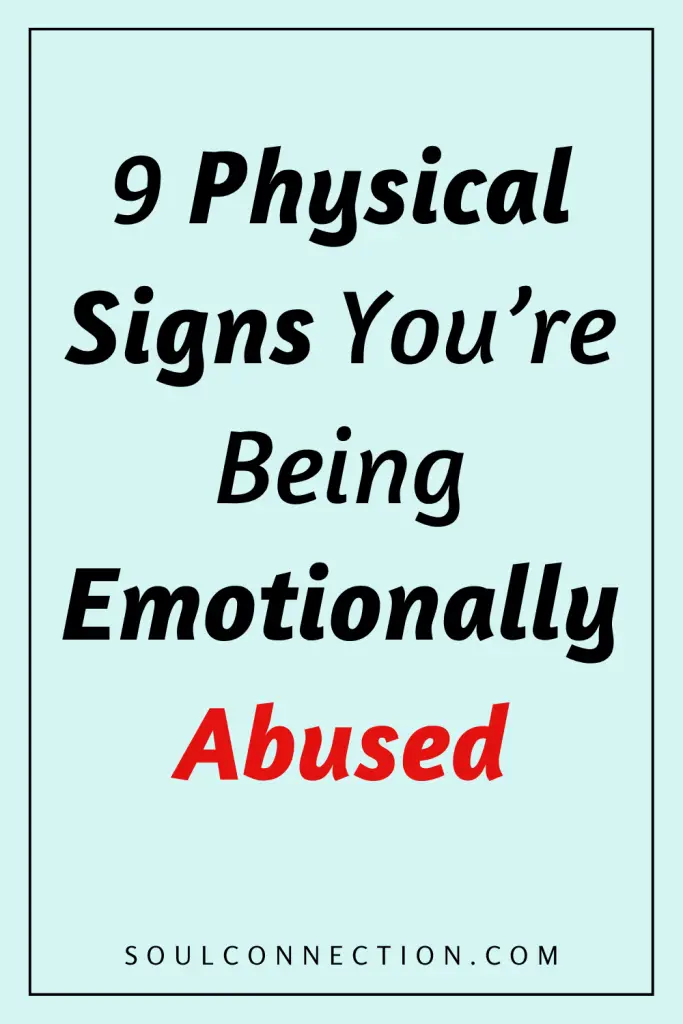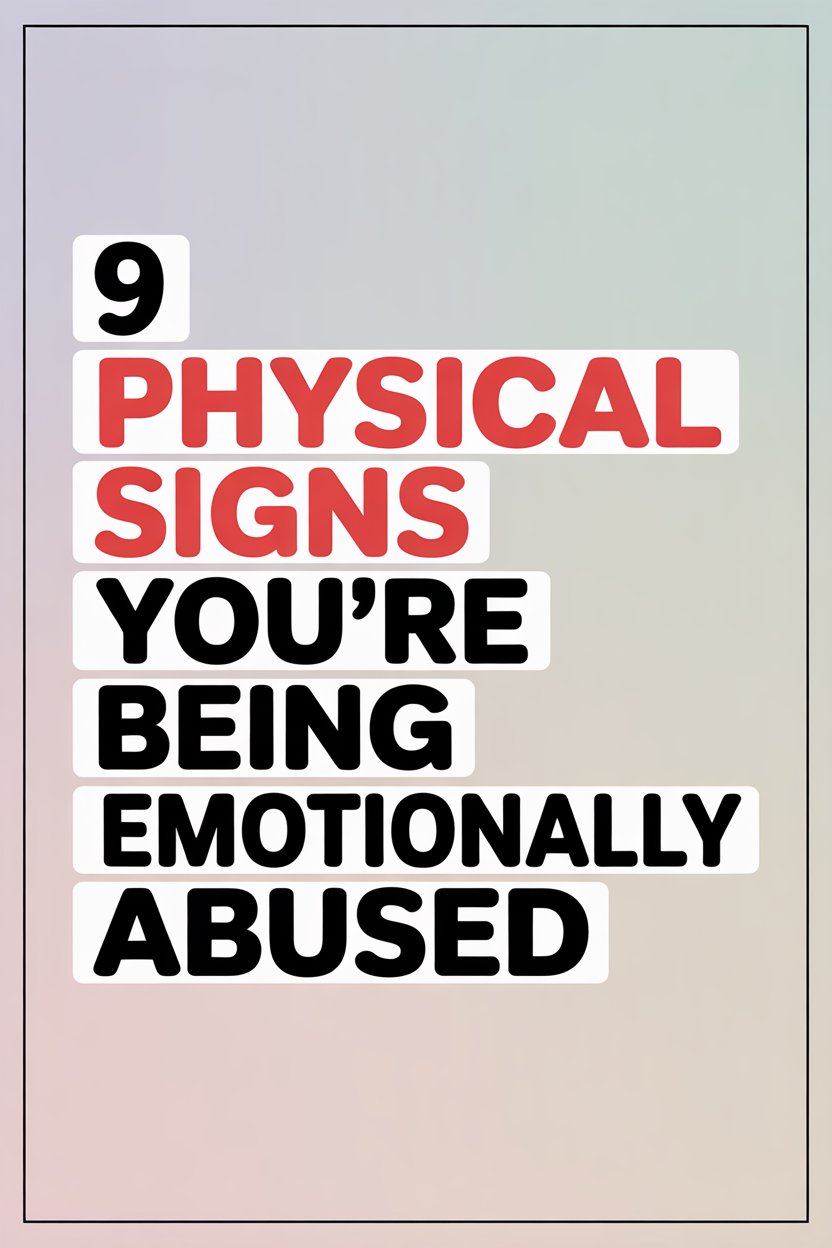Spotting emotional abuse is a bit like searching for your keys in the dark—frustrating, confusing, and guaranteed to make you question your sanity. The trouble is, emotional abuse doesn’t leave bruises you can point to, not the obvious ones, anyway.
But here’s the thing: your body is screaming the truth, long before your mind dares to whisper it.
If you’ve wondered why you feel like a walking stress ball or why your sleep has vanished into the Bermuda Triangle, it might be time to listen to those aches and pains. Let’s shed some light on the ways your body might be waving red flags.
1. Chronic Fatigue That Coffee Can’t Fix
Dragging yourself through the day with the energy of a soggy dishcloth? Emotional abuse thrives on stress, and your body responds by pumping out stress hormones until you’re running on fumes.
This isn’t the regular tiredness you shake off with a power nap. It’s a deep, bone-aching exhaustion that no amount of sleep or caffeine can fix.
You might find yourself yawning at noon, daydreaming about bed before dinner, or needing Herculean effort just to get dressed.
Your body’s stuck in high-alert mode. The emotional roller coaster—walking on eggshells, bracing for the next put-down—keeps your adrenaline on tap.
No wonder you’re exhausted. Chronic fatigue isn’t just about being “lazy.” It’s your body’s SOS.
2. Headaches That Just Won’t Quit
Migraines, tension headaches, a vice squeezing your temples—sound familiar? Emotional distress finds sneaky ways to make your life even more miserable, and headaches are a classic calling card.
When you’re constantly worried about saying the wrong thing, or replaying hurtful comments on a loop, your neck and scalp muscles tense up. Before you know it, you’re reaching for the painkillers (again).
If you’re stocking up on headache meds like it’s cold and flu season—ask yourself why. The pain is real, and your feelings are the root cause.
No, you’re not imagining it, and no, it isn’t “just stress.” It’s your body’s way of begging for a little kindness.
3. Sleep Troubles That Make You Dread Bedtime
Insomnia, fitful sleep, nightmares worthy of a horror flick—when you’re stuck in an emotionally abusive situation, night isn’t a safe haven. You might toss and turn, wake up sweating, or jolt awake at bizarre hours for no clear reason.
Maybe you can’t fall asleep because you’re replaying arguments or trying to predict tomorrow’s mood swings. Or maybe you wake up feeling less rested than when you went to bed.
Sleep is when your brain files away the day’s nonsense. But emotional turmoil turns your mind into a hamster wheel.
If bedtime feels more like a battleground than a sanctuary, it’s not just “a rough patch.” Your body is desperately trying to process what your heart can’t.
4. Unexplained Aches and Pains
Random backaches, stiff neck, stomach cramps that come and go—sometimes it feels like your body is falling apart for no good reason. But muscle pain and mysterious twinges are common when you’re under constant emotional attack.
Stress hormones tighten your muscles, slow your digestion, and make you physically ache.
Ever notice your jaw aches from clenching your teeth during a tense dinner? Or your shoulders are up by your ears after a “talk” that left you shaken?
These aches aren’t random. Your body absorbs every emotional jab, storing the pain until it spills over.
5. Sudden Changes in Appetite or Weight
Some folks eat their feelings. Others lose their appetite entirely. If your eating habits have swung wildly—binging on snacks one week, forgetting meals the next—it’s not just a bad diet.
Emotional abuse messes with your hormones, and your relationship with food gets caught in the crossfire.
Gaining or losing a noticeable amount of weight without trying? It’s worth asking yourself why. Food can become comfort when you feel small and powerless, or it can feel like a chore when nothing else brings joy.
Either way, your body is sending a message.
6. Frequent Illness or Getting Sick More Often
Run-down, sniffly, catching every bug in town? Your immune system’s no superhero when you’re living in survival mode. Chronic emotional stress weakens your defenses, making you more likely to get sick.
Maybe it’s constant colds, or maybe it’s more trips to the doctor for things you never used to worry about.
If you’re starting to feel like the patient in a medical drama, it’s time to pay attention. A battered immune system isn’t just inconvenient—it’s a big red flag that your environment is making you sick. Literally.
7. Heart Racing or Panic Attacks
The fun surprise of a heart pounding like a drum solo, sweaty palms, or dizziness when things get tense—panic attacks can feel like you’re dying, even though your partner insists you’re “overreacting.” (Sigh.)
Emotional abuse keeps your body in a permanent state of “fight or flight.” Your brain is always scanning for danger, even if that danger is someone slamming a cupboard.
If your heart rate spikes during arguments, or you feel shaky when you hear their footsteps, your body is shouting what your head might be trying to ignore. Pay attention to those butterflies in your stomach—they’re trying to warn you.
8. Changes in Sex Drive or Sexual Problems
Sex can be complicated at the best of times. Emotional abuse adds a whole new layer of misery. Some folks lose all interest—touch becomes a trigger, not a comfort.
Others might go the other way, seeking intimacy to feel close or regain a sense of control. If your desire has disappeared or sex itself now feels fraught, guilt-ridden, or even painful, there’s a reason.
Your body knows when you don’t feel safe, even if you haven’t said the words out loud. Emotional safety and physical intimacy are linked. When one’s missing, the other suffers.
9. Worsening Skin, Hair, or Digestive Problems
Ever notice your skin breaking out like a teenager’s, hair thinning, or your gut staging a rebellion? Chronic emotional abuse can trigger or worsen everything from acne to eczema, hair loss to irritable bowel syndrome.
Stress doesn’t just live in your mind; it leaves a mark all over your body.
If no amount of fancy moisturiser, supplements, or herbal teas fixes things, it might be time to look deeper. Your body isn’t betraying you—it’s waving red flags you can’t afford to ignore.
Listening to Your Body When Words Fail
Emotional abuse is masterful at making you doubt your own reality. Gaslighting is real. But your body isn’t in on the con.
All these physical signs are your silent alarm system, warning you that something’s off—even when your partner insists “it’s all in your head.”
Ignoring these symptoms doesn’t make the problem disappear. Instead, acknowledge what your body’s telling you. Keep a journal. Talk to a trusted friend or a professional.
Even one step—like calling a helpline or booking a GP appointment—can make all the difference.
No one deserves to feel unsafe in their own skin, let alone their own home. Your body is doing its best to protect you, and it’s high time you listened.
If you find yourself nodding along to these signs, know this: change is possible, support is out there, and you are not alone—no matter how cleverly the abuser tries to convince you otherwise.
Trust yourself. You’re not “too sensitive.” You’re human, and your body is on your side.


